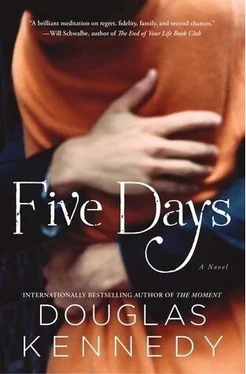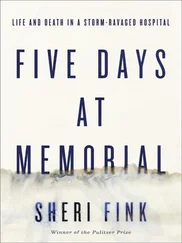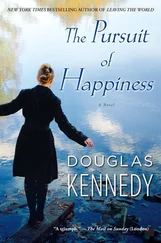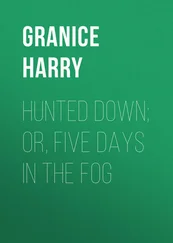Douglas Kennedy - Five Days
Здесь есть возможность читать онлайн «Douglas Kennedy - Five Days» весь текст электронной книги совершенно бесплатно (целиком полную версию без сокращений). В некоторых случаях можно слушать аудио, скачать через торрент в формате fb2 и присутствует краткое содержание. Жанр: Современная проза, на английском языке. Описание произведения, (предисловие) а так же отзывы посетителей доступны на портале библиотеки ЛибКат.
- Название:Five Days
- Автор:
- Жанр:
- Год:неизвестен
- ISBN:нет данных
- Рейтинг книги:3 / 5. Голосов: 1
-
Избранное:Добавить в избранное
- Отзывы:
-
Ваша оценка:
- 60
- 1
- 2
- 3
- 4
- 5
Five Days: краткое содержание, описание и аннотация
Предлагаем к чтению аннотацию, описание, краткое содержание или предисловие (зависит от того, что написал сам автор книги «Five Days»). Если вы не нашли необходимую информацию о книге — напишите в комментариях, мы постараемся отыскать её.
Five Days — читать онлайн бесплатно полную книгу (весь текст) целиком
Ниже представлен текст книги, разбитый по страницам. Система сохранения места последней прочитанной страницы, позволяет с удобством читать онлайн бесплатно книгу «Five Days», без необходимости каждый раз заново искать на чём Вы остановились. Поставьте закладку, и сможете в любой момент перейти на страницу, на которой закончили чтение.
Интервал:
Закладка:
‘That’s news to me.’
‘And to me too. But this sleeplessness I’ve been having recently. my doctor feels that it’s as if the depression, which I’ve kept so submerged for years, has finally found some sort of physiological outlet to let me know I am really not in a good place.’
‘So you are getting help for it?’
I nodded.
‘That’s good,’ Ben said, putting his hand on my arm and squeezing it, a gesture so sweet, so benevolent, so grown-up that I found myself choking back tears again.
‘Sally also hinted that there was something which triggered all this.’
‘I see,’ I said, thinking: My children really do discuss their parents when they are out of our field of vision.
‘Did something happen?’ Ben asked.
I met my son’s gaze and said:
‘A disappointment.’
Ben held my gaze — and in his eyes I could see him registering this, considering its deliberate vagueness, its multiple possible meanings, its implications. and eventually deciding not to push the matter further.
‘Sally told me you’ve been very much elsewhere all week — that she was cutting you a wide berth you seemed so withdrawn.’
‘No sleep does that. But I have some pills to help me now. And I am determined to do what you did — get myself out of the dark wood.’
Some hours later, in the little motel room I had taken for the night (there was no way I was dealing with darkened Maine back roads on no sleep), I found myself crying again as I replayed my conversation with my wonderful son. I also made a mental note to call Sally first thing in the morning — which, for her on a Sunday morning, meant sometime after twelve noon.
Of course there was the little matter of sleep. Dr Bancroft had put me on a strong dose of Mirtazapine, 45 milligrams. And she told me that, if possible, I should take the first dose and not set the alarm clock: just let chemically aided sleep finally wash over me, and wake up when my body decided it wanted to resume consciousness. So I took the pill just after ten p.m., thinking: If anything the drugs will take me away from this fifty-dollar-a-night motel’s fifty-dollar-a-night decor. Then I crawled into the somewhat mildewy bed with a copy of the book I’d brought with me: a collection of poems by Philip Larkin, whom Lucy had been raving about for a while. Shortly after that evening when I ran to her house after Boston, a package from our local independent bookshop in Damariscotta arrived on my doorstep. A new American edition of Larkin’s Complete Poems, with a note from Lucy:
From all accounts, he was the worst sort of Little Englander. But as a poet, the gent really knew how to cut to the heart of the matter and address all that big four-in-the-morning stuff we don’t want to contemplate. If you don’t mind a recommendation, start with ‘Going’ on page 28. Always know you have an escape hatch and a friend here. As you wrote me a few days ago, you’re not alone. Courage and all that. Love — Lucy
The book arrived on Thursday. Though hugely touched by the gesture, and the immense kindness of her note, given the nature of the week I didn’t have the reserves of stamina to tackle anything so clearly close to the emotional bone. But I still packed it in my overnight bag before leaving today. Downing my prescribed dose of Mirtazapine I opened the volume. As suggested by Lucy I turned to page 28 and.
There is an evening coming in
Across the fields, one never seen before
That lights no lamps.
Silken it seems at a distance, yet
When it is drawn up over the knees and breast
It brings no comfort.
Where has the tree gone, that locked
Earth to sky? What is under my hands
That I cannot feel?
What loads my hands down?
I read the poem once. I read it again. I sat even further up in bed and went through it a third time. So that’s where I’ve been for the past few years. The shroud of despair which I mistook for everyday vestments, and which I had pulled over myself, thinking it was my destiny to wear it. I had become convinced that sadness was a condition I simply had to bear. As much as I still ached for Richard — thinking back that, around this time last year, we were making love in that big hotel bed in Boston — I also knew, after reading that extraordinary Larkin poem, that Richard was very much someone who, given the prospect of happiness, decided the hair shirt of ongoing sorrow was one he simply had to wear. He broke both our hearts by making that choice. But what the Larkin poem told me — that the veil of sadness is always there to enshroud us, should we so choose it — was strangely comforting. Because it reminded me that, yes, I wasn’t alone. even if I also knew that the wake of grief trailing me wouldn’t dissipate for some time to come.
Then I felt the ether of grogginess drift over me. I switched off the light. With the blackout came, for the first time in days, that vanishing act from life’s harder realities. Sleep.
The pills worked wonders. They knocked me out every night and ensured that I stayed knocked out for at least seven hours. The ongoing sleep — coupled with (what Dr Bancroft called) the mild anti-depressive properties of Mirtazapine — seemed to let me get through the day without falling victim to the deeper recesses of my sadness.
But I was still sad. I was still not getting over it. Around a week after I’d started taking the pills, Dan surprised me by making an amorous move in bed one night (his pre-dawn schedule and my silent melancholy had, until now, kept us even more on our respective sides of the bed). I didn’t push him away. Pulling up my nightshirt, he began to make gruff, needy love to me. He was inside me within moments. He came around three minutes later. He rolled off me with a groan, then spread my legs and started trying to arouse me with his index finger. I closed my legs. I rolled over. I buried my head in the pillow.
‘You OK?’ he asked.
‘Fine,’ I whispered.
‘We don’t have to stop,’ he said, kissing the back of my neck.
‘I’m tired,’ I said, shifting myself further away from him.
‘OK,’ he said quietly. ‘Goodnight.’
And there we were, alone together again in bed.
The next evening he came on to me again — a little more tenderly this time, but still with that undercurrent of rushed gruffness that had characterized our lovemaking for years. I can’t say that I was attempting to augment things — as I remained quietly detached throughout. I felt bad about my dispassionateness, because my husband was trying to re-establish a connection so long lost. All I could think about was love found, love lost — and how I was back treading domestic water with a man with whom there had been no love for years.
After our ten minutes of sex, Dan kissed me goodnight and promptly fell asleep. It was still early — around eleven p.m. — and tomorrow was Sunday. Sally was out for the evening. The house was quiet. Disquietingly so. This was the future sound of silence that would become quotidian when Sally left for college next year. The deep silence of an uneasy marriage now devoid of the necessary clamor of children, with the left-behind couple wondering how to fill the void between them.
I went down to the living room, poured a glass of red wine, and found myself reaching for The Synonym Finder — omnipresent on the small desk I had set up in a corner of the room. As I sipped the wine, I turned the pages until I came to the word I was looking for: Unhappiness. There were — and I counted them — over one hundred and twenty-two words listed to denote the dissatisfaction that is such an intrinsic part of the human condition. Flipping back to the listings under the letter H I noted that Happiness only contained eighty-one synonyms. Could it be that we search for more words to describe our pain in life rather than the pleasures we can also experience? Would I, a few years from now, on the cusp of my half-century, be sitting here late one Saturday night, flipping through the thesaurus yet again and wondering why I had forced myself to stay put?
Читать дальшеИнтервал:
Закладка:
Похожие книги на «Five Days»
Представляем Вашему вниманию похожие книги на «Five Days» списком для выбора. Мы отобрали схожую по названию и смыслу литературу в надежде предоставить читателям больше вариантов отыскать новые, интересные, ещё непрочитанные произведения.
Обсуждение, отзывы о книге «Five Days» и просто собственные мнения читателей. Оставьте ваши комментарии, напишите, что Вы думаете о произведении, его смысле или главных героях. Укажите что конкретно понравилось, а что нет, и почему Вы так считаете.












